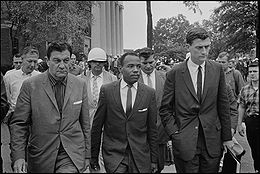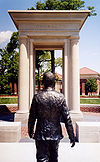- Ole Miss riot of 1962
-
 Chief U.S. Marshal James McShane (left) and John Doar (right) of the Justice Department escorting James Meredith to class at Ole Miss.
Chief U.S. Marshal James McShane (left) and John Doar (right) of the Justice Department escorting James Meredith to class at Ole Miss.
The Ole Miss riot 1962 was a riot fought between Southern segregationist civilians and federal and state forces as a result of the forced enrollment of black student James Meredith at the University of Mississippi (known affectionately as Ole Miss) at Oxford, Mississippi.
On October 1, 1962, James H. Meredith became the first black student at the University of Mississippi,[1] after being barred from entering on September 20 and several other occasions in the following days. His enrollment, publicly opposed by segregationist Governor Ross Barnett, sparked riots on the Oxford campus, which required the U.S. Marshals. Later on (federal) U.S. Army military police from the 503rd Military Police Battalion were sent by President John F. Kennedy. Troops from U.S. Border Patrol and Mississippi National Guard were called in, as well. The involvement of federal forces was opposed for a long time by the President and Attorney General Robert Kennedy. Robert Kennedy had hoped that legal means, along with the escort of U.S. Marshals would be enough to force the Governor to comply.[2] He also was very concerned there might be a "mini-civil war" between the (federal) U.S. Army troops and armed protesters.[2] They reluctantly decided to involve federal forces after the protests turned violent.[3]
The riots led to a violent clash which left two people dead - French journalist Paul Guihard,[4] on assignment for the London Daily Sketch, who was found behind the Lyceum building with a gunshot wound to the back; the second victim was 23-year-old Ray Gunter, a white jukebox repairman who came by out of curiosity. Gunter was found with a bullet wound in his forehead. Both deaths indicated execution-style killings.[5] Barnett was fined $10,000 and sentenced to jail for contempt, but the charges were later dismissed by the 5th Circuit Court of Appeals. Bob Dylan sang about the incident in his song "Oxford Town". Meredith's actions are regarded as a pivotal moment in the history of civil rights in the United States. He graduated on August 18, 1963 with a degree in political science.[6]
Footnotes
- ^ "1962: Mississippi race riots over first black student". BBC News - On this day. October 1, 1962. http://news.bbc.co.uk/onthisday/hi/dates/stories/october/1/newsid_2538000/2538169.stm. Retrieved 2007-10-02.
- ^ a b Schlesinger 2002, 317-320.
- ^ Bryant 2006, 71.
- ^ "Though the Heavens Fall (5 of 7)". TIME. October 12, 1962. http://www.time.com/time/magazine/article/0,9171,829233-5,00.html. Retrieved 2007-10-03.
- ^ Bryant 2006, 70-71.
- ^ Leslie M. Alexander; Walter C. Rucker (2010). Encyclopedia of African American History, Volume 1. ABC-CLIO. p. 890.
References
- Bryant, Nick (Autumn 2006). "Black Man Who Was Crazy Enough to Apply to Ole Miss". The Journal of Blacks in Higher Education (53): 60–71.
- Eagles, Charles W. (Spring 2009). "'The Fight for Men's Minds': The Aftermath of the Ole Miss Riot of 1962". Journal of Mississippi History 71 (1): 1–53.
- Schlesinger, Jr., Arthur (2002 re-print). Robert Kennedy and His Times. New York: First Mariner Books. ISBN 0618219285..
Categories:- Racially motivated violence against African Americans
- University of Mississippi
- Riots and civil disorder in the United States
- 1962 in the United States
- 1962 riots
Wikimedia Foundation. 2010.

